March 7, 2018
Women who say no

The most feminist thing I’ve done lately was send an email including the line, “It sounds like a great event, but to do the job effectively it would take up a bunch of my time and I can’t afford to do that for free.” A line that sounds straightforward in its delivery, not unfriendly, and kind of obvious, even, but to write that line was the result of a whole lot of thinking and some necessary urging to do something that was brave. Because I think that we all need to do a better job of valuing women’s time. People in general need to do this, other women need to do this (i.e. stop sending messages to strangers asking if you can buy them a coffee in exchange for “picking their brains” [and ew!]), and many of us need to do a better job of doing it on our own behalf. Which is to say, we need to start feeling okay about saying no to opportunities that aren’t valuable ways of spending our time. We have to stop feeling obligated to say yes, to help out, to step in, and be of service. Women have to stop feeling grateful to be asked at all, to be noticed.
But it’s complicated, of course. Ten years ago I recall requiring all the opportunities I could get as I was building my writing c.v, and any visibility at all was a huge deal, a confirmation that I existed as a writer. I also am eternally grateful to many people (mostly women) who’ve been so generous toward me with their valuable time over the years, writing guest posts for my blog, reading my manuscripts, having me interview them, who’ve written reviews of my work for pennies or even for free, and who—out of the goodness of their hearts and for community building purposes—have organized events I’ve been lucky to take part in. If everybody was always putting a monetary value on creative work and the hours in their day, I don’t know that I’d have gotten anywhere at all.
And so this is the reason why I’m always happy to repay favours, to support friends, to write effusive blog reviews about a book I’ve no connection to except that I really really love it and I think everybody needs to know about it too. As a blogger, I don’t get paid for my creative work on a regular basis—and I’m okay with that, because I’ve found other ways to make my blog useful for me and also my blog has led to paying professional opportunities to supplement the work I don’t get paid for. (I also really like blogging, and the opportunity to spread the word about books that I love.) And as an author, I’m happy to do anything at all to promote my book—I will write an article, answer your Q&A, rent a car and drive to Durham Region, and even consent to talk on the telephone (which, in my opinion, is asking a lot). I know there is not an abundance of money in the publishing industry, and most of us are doing most of what we’re doing out of goodwill anyway.
But I still think it’s a lot to ask someone to host an event, for example, to launch a book whose author one has no connection to. That’s an evening out of my life, cost of transit, plus all the preparation to make sure I do the job properly, plus all the necessary anxiety that goes with standing up in front of a room full of people (and the matter of hair and make-up, and what I am supposed to wear). It’s also a lot to ask me to read your manuscript. It’s a lot of ask me to be a juror and read the 12 books on the shortlist for your book prize. It’s a lot to ask me to answer your list of questions about how to make it in publishing, or to interview you at your book launch or on my blog, or to blurb your novel by Sunday.
If you are my friend and/or I admire your work, I will probably be happy to do these things, to pay forward the goodwill I’ve been fortunate to benefit from over the past decade. If I have actually agreed to do any of these things for you in the future or the recent past, it was because I wanted to. And I do think that if people want to make these requests of writers, they should feel free to do so—what’s the harm in asking? But they should also be cognizant of just how much they’re actually asking for (a lot!), and be both comfortable and unsurprised when the person being asked declines because of the reality they’d be getting absolutely nothing out of the experience.
I’ve never forgotten Lynn Coady’s 2012 article that pertains to this very issue, about how liberating it is for a writer to learn to say no: “with every ‘no’ that’s uttered, the easier it becomes to swim past the breakers of passive-aggressive reproach.” I think that Coady’s article is also an article that only a woman could have written—valuing men’s time seems more instinctual for many of us; in general too, we tend to ask less of male writers, who have fewer expectations upon them to be available, accessible, because they’re so busy holed up in their garrets being geniuses instead of relatable; and because of the garrets and not being relatable, they’re probably more adept than women writers are at saying no and then not feeling badly about it for days and days.
Along with all the women who’ve supported me and my work, the women who’ve said yes, I am also grateful for the women who’ve said no, for the example they set for the kind of savvy and self-preserving, self-respectful artist human I want to be.
January 10, 2018
“Be as large as you’d like to be.”
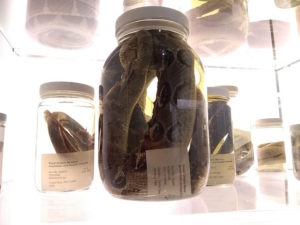 I was all set to write a blog post about how I hurt my elbow on the Christmas holidays because I fell off the couch when I was bound and gagged (this actually happened) but you’re going to have to wait until next week now for that story because I’ve got something on my mind. I was thinking about the fallout from what’s happening regarding Concordia University’s English Department (short version: a man articulated something women have been talking about for years regarding predatory males on the faculty, and then yesterday it was the six o’ clock news), all these conversations about men in positions of power—and then it occurred to me, “What is this ‘power’ we’re talking about?” The power of a part-time job teaching creative writing? The power of a handful of slim books of poetry whose sales total into the hundreds? The power of editing a literary magazine that nobody ever reads unless they’d like to be published by them (which would then permit said reader/writer the power of a publication credit)? If this is what passes for “power,” then we’re sadly impotent, the lot of us.
I was all set to write a blog post about how I hurt my elbow on the Christmas holidays because I fell off the couch when I was bound and gagged (this actually happened) but you’re going to have to wait until next week now for that story because I’ve got something on my mind. I was thinking about the fallout from what’s happening regarding Concordia University’s English Department (short version: a man articulated something women have been talking about for years regarding predatory males on the faculty, and then yesterday it was the six o’ clock news), all these conversations about men in positions of power—and then it occurred to me, “What is this ‘power’ we’re talking about?” The power of a part-time job teaching creative writing? The power of a handful of slim books of poetry whose sales total into the hundreds? The power of editing a literary magazine that nobody ever reads unless they’d like to be published by them (which would then permit said reader/writer the power of a publication credit)? If this is what passes for “power,” then we’re sadly impotent, the lot of us.
Of course, there is power. As a reader and a writer and someone who published a small press book and continues to be grateful to publish in literary journals, I know that there is indeed power in words, poems and stories; that lit mags can be magic; that small independent presses can move mountains; and a slim book that sells a few hundred copies might matter so much. I do not seek to undermine these institutions, systems and networks. I feel fortunate to have benefitted from them, but I also know that their power is in the works themselves, and that it’s a small and subtle thing, a power that can’t be quantified. This real power is also not a thing that can be lorded over others.
But I’m getting away from the point here, which is the ridiculous fact that a slovenly man with a part-time job and magazine imagines himself as having power. That we’re meant to looking up to a guy who churns out books that nobody reads and who is trapped in perpetual adolescence. That eventually that guy is in his fifties, and he’s entertaining the notion that a brilliant young woman might want to have sex with him—where, I would like to know, does a person get a sense of entitlement like that? Because, quite frankly, I would like to go there and get some too.
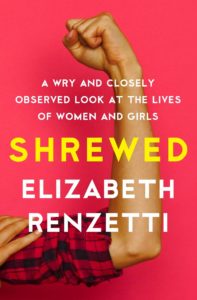 On Sunday I read an advanced copy (out in March) of Elizabeth Renzetti’s brilliant, generous, biting and moving collection of essays , Shrewed: A Wry and Closely Observed Look at the Lives of Women and Girls. I loved it. I wanted to read passages to my daughters, buy a copy for my mother, and plan to implore everyone I know to pick up a copy. Several essays had me in tears by the end, others made me want to grab a placard and march down the street, my shrill voice exclaiming, Feminist, feminist, feminist, feminist, feminist is for me! It’s a beautiful book rich with lessons learned from a few decades on the feminist frontline. And the theme that emerged as I read the essays was of not-enoughness—not enough women on the US Supreme Court, not enough women MPs in Canada’s House of Commons. (Related: why does nobody ever ask how many is enough men? Oh, wait! Me all the time. But never mind. Maybe a man will write a blog post about it and then we can hear about it tomorrow on the news.)
On Sunday I read an advanced copy (out in March) of Elizabeth Renzetti’s brilliant, generous, biting and moving collection of essays , Shrewed: A Wry and Closely Observed Look at the Lives of Women and Girls. I loved it. I wanted to read passages to my daughters, buy a copy for my mother, and plan to implore everyone I know to pick up a copy. Several essays had me in tears by the end, others made me want to grab a placard and march down the street, my shrill voice exclaiming, Feminist, feminist, feminist, feminist, feminist is for me! It’s a beautiful book rich with lessons learned from a few decades on the feminist frontline. And the theme that emerged as I read the essays was of not-enoughness—not enough women on the US Supreme Court, not enough women MPs in Canada’s House of Commons. (Related: why does nobody ever ask how many is enough men? Oh, wait! Me all the time. But never mind. Maybe a man will write a blog post about it and then we can hear about it tomorrow on the news.)
And of course, the book is very much about the way that women are made to feel as though they themselves are never enough—not smart enough, pretty enough, assertive enough, friendly enough, small enough, imposing enough, busty enough, thin enough, conforming enough, or original enough. As a woman, there are infinite ways to be faulty. Which is why it’s particularly powerful when Renzetti writes in her final piece, “Size Matters: A Commencement Address”: “Be large. Be as large as you’d like to be. Take up room that is yours. Spread into every crack and corner and wide plain of this magnificent world. Sit with your legs apart on the subway until a man is forced, politely, to ask you to slide over so he can have a seat. Get the dressing on the salad. Get two dressings. Order the ribs on a first date.”
(And then she goes on to write, “Throw away your scale. Stop weighing yourself. Is there ever a reason to know your precise weight? Are you mailing yourself to China? Are you a bag of cocaine?” Oh my gosh, this book…)
There are so many lessons that I’m taking away with this tragedy/debacle at Concordia/the world in general, but here’s the one I am focussing on today: if a slovenly largely unsuccessful middle aged writer can imagine himself a powerful sexual Lothario then it is possible I might actually be enough after all. Even more than. If a fucking imbecile can be President of the United States, there is really not limit for the rest of us sentient beings. If some guy who edits a literary journal is a powerful figure, then I am fucking King Kong with Godzilla riding on my shoulders, and so are you. And from now on we should be that large, and own the power we’re entitled to.
December 6, 2017
The Reason We Persist
 December 6 is a weighty day in Canada as we remember the 14 women murdered in Montreal at Ecole Polytechnique in 1989, and women who are victims of violence (male violence) across this country and beyond, including more than a thousand missing and murdered Indigenous women. And every year it hits me harder and harder, the realization at how little women and their work and their voices and their bodies are valued. When I was a university student I used to sing in a choir and every year on December 6 we’d participate in a memorial for the murdered women, and while it moved me and broke my heart, the violence and rage that was the impetus for the massacre seemed far away then in time and place. I thought Montreal in 1989 was an outlier, that we’d got beyond it. But in the last few years, I’ve felt it closer and closer, more and more personally. Every December 6 for the last few years it’s occurred to me that I’ve realized an even deeper understanding of how much our society hates women than I’d had the year before. We are the same society in which a Canadian MP stood in the House of Parliament in 1982 to speak about domestic violence and her colleagues responded by laughing.
December 6 is a weighty day in Canada as we remember the 14 women murdered in Montreal at Ecole Polytechnique in 1989, and women who are victims of violence (male violence) across this country and beyond, including more than a thousand missing and murdered Indigenous women. And every year it hits me harder and harder, the realization at how little women and their work and their voices and their bodies are valued. When I was a university student I used to sing in a choir and every year on December 6 we’d participate in a memorial for the murdered women, and while it moved me and broke my heart, the violence and rage that was the impetus for the massacre seemed far away then in time and place. I thought Montreal in 1989 was an outlier, that we’d got beyond it. But in the last few years, I’ve felt it closer and closer, more and more personally. Every December 6 for the last few years it’s occurred to me that I’ve realized an even deeper understanding of how much our society hates women than I’d had the year before. We are the same society in which a Canadian MP stood in the House of Parliament in 1982 to speak about domestic violence and her colleagues responded by laughing.
Two posts by friends today got me thinking though, one writing about the complicatedness of her family’s celebration of Saint Nicholas Day on December 6, along with commemorating what happened in 1989. Another noting that it was her son’s birthday, a strange mix of feelings and emotions which underlines her intent to raise her boy to be a good man. And it’s these stories that make me feel better, actually, the way that memory and mourning and activism are built around the joyful and hopeful corners of our lives. All of it is the world and life itself, and no part is less worthy than any other for inclusion in the precious hours of our day. These joyful hopeful corners are why activism and politics mean anything, actually. They’re the reason we persist in hoping for and working for change.
October 25, 2017
F-Bomb: Dispatches From the War on Feminism, by Lauren McKeon
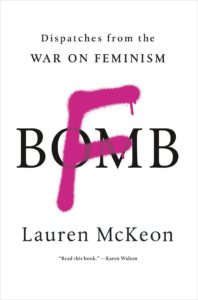 There were women who actively campaigned against universal suffrage. When I learned about this a while ago, the revelation stunned me—but also was something of a comfort. That this kind of lunacy was not without precedent, I mean. That women (and people in general) have always been self-defeating and so obstinate. It’s almost admirable. Almost. But not really, because it’s also dangerous and stupid and it terrifies me. Last fall I spent an inordinate amount of time arguing with strangers on twitter about feminism, in one circumstance about why MPs shouldn’t have to put up with being called “ugly cunt” and threatened with rape or death, for example. Suggesting that this was a gender problem, mostly because this sort of thing didn’t happen to MPs who weren’t women, but plenty of women disagreed with me. Online abuse, they informed me, is simply part of life, and to suggest that women weren’t tough enough to take it, to roll with the punches, was a blatant example of sexism. And it was roundabout this point that my brain twisted into a pretzel shape, and then my head completely exploded.
There were women who actively campaigned against universal suffrage. When I learned about this a while ago, the revelation stunned me—but also was something of a comfort. That this kind of lunacy was not without precedent, I mean. That women (and people in general) have always been self-defeating and so obstinate. It’s almost admirable. Almost. But not really, because it’s also dangerous and stupid and it terrifies me. Last fall I spent an inordinate amount of time arguing with strangers on twitter about feminism, in one circumstance about why MPs shouldn’t have to put up with being called “ugly cunt” and threatened with rape or death, for example. Suggesting that this was a gender problem, mostly because this sort of thing didn’t happen to MPs who weren’t women, but plenty of women disagreed with me. Online abuse, they informed me, is simply part of life, and to suggest that women weren’t tough enough to take it, to roll with the punches, was a blatant example of sexism. And it was roundabout this point that my brain twisted into a pretzel shape, and then my head completely exploded.
And so while the general content of Lauren McKeon’s new book, F-Bomb: Dispatches from the War of Feminism, would not come as news to me, the book itself actually proved to be a comfort. Showing me that I hadn’t gone completely insane, for example, as my conversations on Twitter were really causing me to think I had, and that anti-feminism is indeed an actual phenomenon. Which, when unarticulated, seems encroaching and awful, when suddenly everyone who’s wrong gets to be right (and very loud). But McKeon situates the phenomenon in its own context and the context of our current political nonsensicalness, and her analysis actual made me feel better. As in, here is a thing and it’s insane but it’s also graspable, and the only thing any thinking person can do is try to understand it and to learn.
“[E]early feminists…largely protested abortion, at least in public. Still, as much as we owe a debt to these women, I’m not about to grab a petticoat and try to be them. I might picture myself standing on their shoulders, but its not in a straight and unwavering line. Rather, it’s an inverted pyramid that allows for pluralities and expansion, a rejection of this idea that it’s good to go backward.”
“An inverted pyramid that allows for pluralities and expansion” is a fair articulation of McKeon’s feminism in general, and I love that. I appreciate too the way that she necessarily complicates the idea of first/second/third/fourth wave feminisms too: “As much as older feminists can seem surprised and baffled by younger feminists, the lines aren’t strictly generational; they’re ideological.” Calling upon a discussion of generational divides by Bitch co-founder Lisa Jervis, McKeon writes: “Categorizing feminism into waves flattens the differences in feminist ideologies within the same generation and discounts the similarities between different ones, all in one fell swoop… When we buy into the wave theory, we forget common goals, like the fight for abortion rights, equal pay, and ending violence against women.”
But while McKeon suggests that feminism can indeed thrive on difference, she affirms that we’re nowhere near there yet. White women, she writes, still have ways to go in confronting their privilege, in complicating their own understandings of feminism, and moving over (or even sitting down) to make room for other voices. “If feminism wants to survive and grow, not shrink, it’s vital that it learn how to communicate within itself.”
Because here’s what feminism is up against, as McKeon delineates in the rest of the book: there is the usual chorus of “I’m not a feminist, but…” people, who are only too happy to benefit from the movement, while contributing nothing to it. Men’s rights organizations are on the rise, and women are jumping on board their bandwagon. McKeon delves into the Men’s Rights movements, while never losing her feminist footing (“The men’s rights movement is fond of saying its members don’t hate women. What a load of BS… That’s akin to saying an abusive husband likes his wife. Whatever, buddy; that’s not the point.”) McKeon finds roots of the movement in 19th century magazine editorials, and in the 1989 Montreal Massacre too, whose perpetrator hated feminists. What’s new, however, is the movement’s modern rebranding toward a superficial notion of equality, claiming a universality due to the women who are happy to be its public face.
McKeon speaks to some of these women, who are unabashed in their contradictions (and, usually, in also their ignorance too). A Thunder Bay housewife who writes about how women shouldn’t have the right to vote (who concedes that her brash online persona is mostly bluster and clickbait—and this is a problem, the damage done by so-called provocateurs who are literally profiting on online outrage). A writer of erotica whose website was trolled by anti-feminists…who led her to their website, and won her over, and now pulls in thousands of dollars per speaking engagement. These women’s con-jobs, McKeon writes, are remarkable: “convincing women to shun victimhood without actually doing anything to make us not victims… They’re like the Houdinis of discrimination and hate, conjuring up amazing illusions. Underneath it all, though, the message is essentially: let’s keep things unequal for women, so everybody wins!”
She goes on to critique opt-out culture and the domestication of pre-feminist gender roles, which feeds right into men’s rights rhetoric and fuels the faux-polarization of stay at home moms and working ones, which obscures realities including class. These nostalgics also forget that 1950s housewives were miserable, purged from postwar jobs and stuck in the suburbs on tranquilizers, and blamed for everything that was wrong with their children. It was not a great time, folks. And those who think it was have misunderstood the intentions of second-wave feminists—McKeon points out that Betty Friedan “wanted better treatment for housewives, not to abolish the role.” The myth of “having it all” was invented not by feminists, but by journalists, who’ve been trying to sell magazines (and pitting women against each other) with it for decades.
It is the context of a conscious effort to keep women out of the workforce that McKeon writes about “Gamergate,” the online movement targeted at abusing women who wanted to have a voice in the video game industry—and precedent for the dumpster fire that was the 2016 US Presidential Election. But it also stands for the way that women are driven out of lots of industries, McKeon posits, often for being pregnant, or having sick children to care for. Or simply because they can’t afford the costs of childcare. And anti-feminists dispute all of this, of course. The wage gap is a lie, they’ll tell you. McKeon writes, “By capitalizing on women’s anxieties about doing/having/being it all, and simultaneously crafting these neat little pretzel knots of logic, anti-feminists have helped strengthen the silence.”
And speaking of silence, she writes about women denying rape culture and the violence of sexual assault—including the groups of mothers whose sons have been accused of rape and have started a group in support of boys in their sons’ situations, actively trying to convince women that the things that happened to them weren’t even rape after all. (“‘You can make a good faith mistake about whether you were raped,'” Stotland assured me, presumably benevolent, like a fairy godmother of victim blaming.”)
She writes about the rebranding of anti-abortion activists as pro-women as well, and the ways in which their movement is gaining ground, with access to abortion becoming more and more difficult across the United States (and in some parts of Canada, it’s never been great anyway). Is “pro-life feminism” even a thing? McKeon quotes an activist, “The future is pro-life female… We’re not trying to control women or take over their bodies—that’s not it at all… We believe you should have control over your body from the moment it first exists.” McKeon writes that pro-life feminism lacks an agenda beyond being anti-abortion, and that its rhetoric is unlikely to take hold in the feminist movement proper… “But can I see it working alongside the anti-feminist and post-feminist movements to crush modern intersectional feminisms and the reproductive and sexual rights around which they mobilize? Well, yeah, sure, I can see that.”
The book ends on a hopeful note, you will be happy to know. McKeon’s second-last chapter is about young empowered feminists who waging brave and awesome campaigns, both online and in the world. She goes back to high school, where her own feminism was born in a gender studies class, and is inspired and moved by the conversations she sees happening there. The idea that young women don’t care about feminism is a myth up there with “having it all.”
And then she concludes her book with her trip to the Women’s March in Washington on January 21 2017, a monumental event whose media coverage fuelled discord and served the anti-feminist agenda exactly…except the Women’s March was a triumph. The Women’s March was amazing.
“Was the Women’s March on Washington a crucial time for women to join together, or was it an opportunity to confront its historically privileged and narrowly rigid roots?” McKeon asks. The answer is simple. The answer is easy (but it also isn’t). The answer is affirmatively positive: McKeon answers, “Yes. And yes.” And the rest of her book is the reason why she and her reader are so emphatic that this must be the case.
May 14, 2017
On Mother’s Day, I am grateful for my abortion.
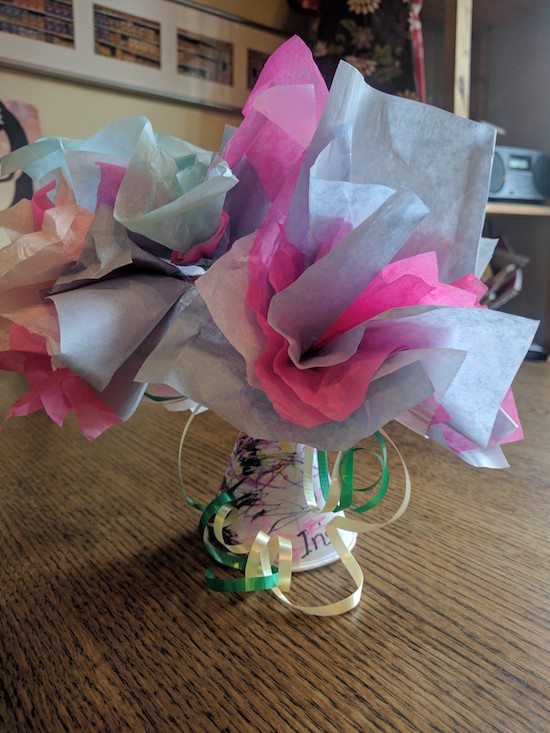
On Mother’s Day, I am grateful for my abortion. Which might sound intentionally provocative, but it isn’t. If you think very hard you might be able to fathom the banality of being grateful for this one thing upon which my adult life has hinged, from which everything since has come from, every single ordinary wonderful thing. Although I wasn’t always grateful—at the time such a thing as gratitude never occurred to me. To have the freedom to make a decision about my own body and my own destiny—that sounds kind of banal as well. It was 2002 and things were politically different, or at least I was isolated enough to think they were. At the time it wouldn’t have occurred to me that The Handmaid’s Tale was prescient.
But none of that is actually what I’m thinking about today, in 2017, amidst the conversations about cultural appropriation I’ve been listening to all for the last few days—except for yesterday when I took a blessed internet sabbatical. Instead, I am grateful for my abortion for another reason, for the ability my experiences of abortion and motherhood have given me to grasp nuance, hold uncertainty and hold two ideas in my head at once. “A single thing can have two realities.” My abortion enabled me to articulate this idea, to come to know the necessity of in-betweeness. It’s a point of view that many people a great deal smarter than I am have still not been able to grasp.
I was thinking about this this morning as I read Barbara Kay’s remarkable twitter timeline which must have originated in defence of her son who has been called out for supporting a “cultural appropriation prize” in defence of another editor who has (seemingly) been set-upon by the twitter mobs. I’ve never seen such an example of one misguided offensive thing spiralling into a whirlwind of absolutely abhorrent behaviour, the kind of behaviour that would embarrass a daycare room of toddlers, with apologies to toddlers. Barbara Kay daring to make a terrible thing even worse by for some reason claiming that positive experiences of Indigenous people in Canadian residential schools had been censored from the official report, which Kay hasn’t even read. (“Is there no subject matter you don’t know about that you feel qualified to opine on?” asks Maggie Wente on Twitter.)
It was all so preposterous that I did the thing that no one should ever do, which is click over to Barbara Kay’s timeline where she was retweeting some guy who’d tweeted, ‘Nothing says “I love you, mom” like a child you didn’t abort.’ And here, I thought, was exactly the problem. A person who’d think that was the reality of abortion and motherhood would be the person limited enough not to understand how one could support free speech and respecting Indigenous cultures. Not to see that Black Lives Matter means that all lives matter. The kind of person who doesn’t seem to get that you can find female genital mutilation appalling and still not be a raging racist, or even be a feminist who supports the right of other women to do what they like with their bodies—adorn it with a headscarf, even. That women who have abortions might be the same women who’ve mourned miscarriages, or who celebrate life-saving techniques that make it possible for babies born as early as 23 weeks to go on to thrive. These are also, I must point out, the same people who REFUSE to understand that most late-term abortions are performed on babies that were desperately wanted but nonviable due to fetal abnormalities. People who don’t get that a person like me who was so grateful for her abortion at six weeks can understand that for many women “choice” can be the lesser of two tragedies.
I am grateful for my abortion, because my experience as a pro-choice woman has informed so much of my understanding of power structures and oppression . It’s why I’m not sure “debate” is the answer, because I’ve had to stand on the street corner “debating” my bodily autonomy with a twenty year old Catholic boy, and I’m not sure it really got me anywhere. It’s why I know that “Yes, but…” is usually a better answer, and that sometimes we have to acknowledge that people really are the experts on their own lives and experiences. That listening is usually the best course. That we all have a lot to learn from each other. That sometimes the things that make us uncomfortable are the real things, and that grey areas exist for a reason and we have a lot of discover where they do.
If not for my abortion, I might think that questions have easy answers, that the world has easy answers, that life is uncomplicated, tidy and straightforward. I might not even understand that this can be true: if not for my abortion, I wouldn’t have my children. So on Mother’s Day, I’m more grateful than ever.
April 4, 2017
A Handy Guide to Explaining Graphic Anti-Choice Public Transit Ads to Your Children

“How am I supposed to explain this to my children?” is a question many people are grappling with in my hometown right now, where the city failed to fight a campaign by a group of fetus enthusiasts to display graphic anti-choice images on the sides of busses. Images that, I will remind you, are enlarged hundreds of times beyond their actual size, because (as a young man campaigning “for life” in the street once affirmed for me) if you showed images of abortions at their actual size (also known as REALITY) “they wouldn’t have any impact.” Which should give anyone pause…
But apparently not, because the ads are due to start running this week. As someone who has already talked about these ads with my children, however, I have wisdom to impart here which might be relevant to other parents. This is how I gave them the lay of the anti-choice land.
- A lot of things happen to women in their lives, I tell them. A lot of women have babies. And many women who want to have babies end up having their babies die before they are born, often for no reason that anyone can discern. And other women who want babies find out far into their pregnancies that their babies are not growing properly and they make the decisions to end their pregnancies—which is a painful, agonizing choice to have to make and leave families sad for a very long time. Other women find out they are pregnant when they don’t want to be, and these women can also make the choice to end their pregnancies, and sometimes this is sad and sometimes it isn’t.
- And then I remind them that the fact that women get to make choices about their own bodies makes a lot of people really angry. Sometimes those people are men and sometimes they are women. Sometimes they are people who themselves have lost babies they desperately wanted, which has left them unable to understand that their situation does not apply to everyone, that restricting someone else’s choice isn’t going to make their own loss any less. (And some of these people are pro-life dude-bro’s who are in their early 20s and as ridiculously empowered as they are ignorant about women’s lives and experiences. Mamas, don’t let your babies grow up to be pro-life dude-bro’s.)
- “A lot of people are huge assholes,” I remind my children. We see evidence of this everywhere. We try to love the world and humanity anyway, however. It is an ongoing project.
- And these huge assholes, I tell my children, have no problem with taking these intimate, personal, complicated experiences of women’s lives and driving them around town on the side of a bus via wholly misleading images. They have either not paused to reflect on or do not care in the slightest about how these images are as violent and cruel as they are misleading. On what it might mean to be coming home from the ER after realizing you are miscarrying and seeing that bus drive by you. Or even worse, when you’re waiting at the bus stop as you are miscarrying, and that’s the bus that pulls up. Public transit is not frequent enough in my hometown that you could just sit down and wait for the next one. I tell my children that the people who’ve placed these ads have not bothered to put themselves in that woman’s place, or the place of her partner, her children, all those people who know how complicated women’s health and women’s lives can be. I tell my children, Don’t be these people. I tell them there is such a thing as empathy. I tell my children: “In your lives, be better than that.”
- I tell them, “You know the problem, the reason these ads have happened at all and the reason people are able to rest afloat on the seas of their own ignorance, is that we don’t talk about abortion enough. A person lacking in curiosity might think that these aren’t issues that have affected nearly everyone. So in a way, even though the images are gross and fake, they give us cause to be grateful. Here we are talking about it. A good moment to remind you, my daughter, that your body—and the choice of what to do with it—is your own.”
February 9, 2017
Ada Lovelace: Poet of Science, by Diane Stanley and Jessie Hartland
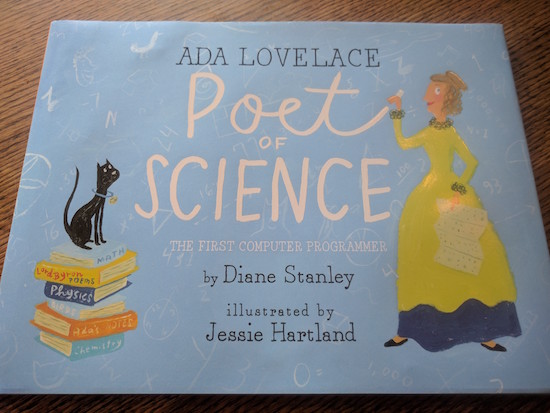
Harriet and I went to see the remarkable Hidden Figures on the weekend, and until the picture book version of the story is released, we will content ourselves with Ada Lovelace, Poet of Science: The First Computer Programmer, by Diane Stanley, illustrated by Jessie Hartland, which was recently selected by the America Library Association among the top ten feminist picture books of last year. (We also know Ada Byron [later Lovelace] as a character from Canadian author Jordan Stratford’s middle-grade series, The Wollstonecraft Detective Agency.)
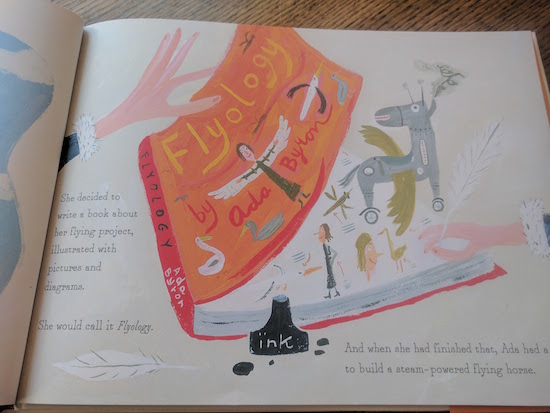
True confession: I don’t understand computer programming. It’s possible that a lifetime of being told that math is hard made me believe that math is hard, or maybe I just find math hard, but my mind doesn’t work that way. I’ve read Ada Lovelace: Poet of Science several times, and while I understand in theory how Ada imagined Charles Babbage’s Analytical Engine worked based on symbols and rules of operation changed into digital form…I actually don’t even understand it in theory. Ada Lovelace’s ideas were inspired by mechanical looms which wove textiles based on patterns dictated by punched cards. I don’t really understand that either.
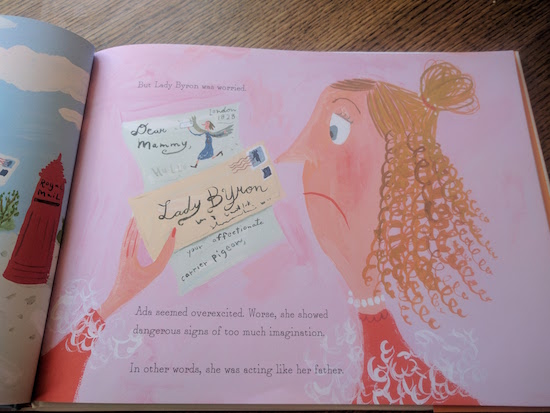
But but but. There is more than one way to be a person, to be a woman, to have a brain. That such things befuddle me is not to say that women are like that and let’s all go back to rocking babies, but instead to say that some women have an aptitude for such things, and it’s useful for even those of us who don’t to realize this. It’s like saying, Maybe I don’t need feminism, but some women do. (Nobody ever says this though. People who don’t need feminism seem to forget the possibility of second clauses.) To be honest, I’m not sure my daughter is going to grow up to be a computer programmer either, genes being what they are, but I will insist on the fact that she knows it’s a possibility. I mean, if a girl could have been one two hundred years ago, before there were even actual computers, then maybe today there are perhaps no limits of what a girl can grow up to be. And isn’t that excellent?
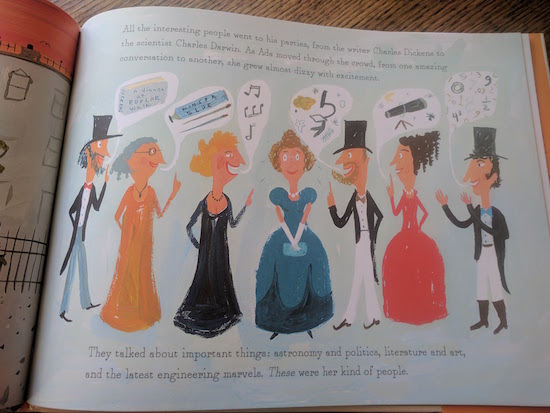
We love this book, about Ada (who gives Rosie Revere, Engineer a run for her money) who has a spectacular imagination, despite her mother’s attempts to school her in logic and rational thinking in order to override her passionate poet father’s genetic legacy. As women of her station had to do, she settled down and married, but that wasn’t the end of her story, and she would go on to do remarkable things in her too short life, indeed becoming the world’s first computer programmer with Babbage’s analytical machine. And what is especially interesting is that there is no direct link between Babbage’s and Lovelace’s work and the development of modern computers, although as Stanley’s author’s note points out, Alan Turing would read their work after they resurfaced after a century of obscurity. But still, I am fascinated by this idea (which is so recurrent in feminism) that some ideas have to be invented over and over again. Or perhaps it’s more miraculous than that—that the great discoveries don’t just happen once, and that progress ain’t a line, but that spectacular bursts of excellence are exploding all the time.
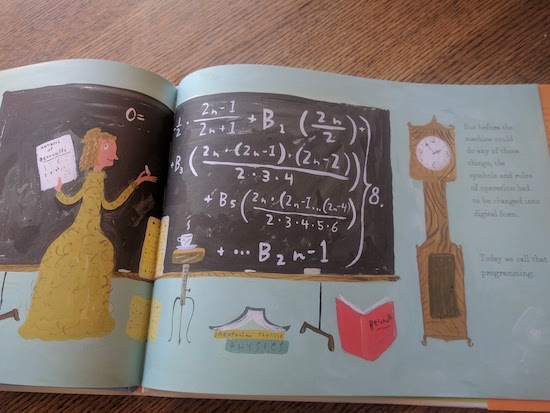
January 28, 2017
Dear Pro-Lifer
 Dear Pro-Lifer,
Dear Pro-Lifer,
Once upon a time. I used to think that you and I could talk. I used to think that if you would just be willing to sit down and listen, I could make you understand that in prioritizing the rights of a fetus you must necessarily steamroll over the bodies and lives of actual women. Surely, I thought, the problem here—our miscommunication—was that you hadn’t realized the terrifying implications of this.
But now I see that you do understand, and the problem is that you just don’t care.
For your benefit, I’m going to spend a moment here situating the abortion issue as a “debate.” Because I know this is how you are see it, that here we are on different sides (when the reality, my friend, is that I am just a person with a body who is quite adamant that you don’t get to decide what I do with it. In reality, why would my bodily autonomy be yours to debate? This is like me telling you how often your should trim your toenails).
So here is my “side”: it’s not that I’ve got anything against fetuses, in fact everybody I’ve ever loved used to be one. My own children, when they were fetuses, were the most precious beings in the world to me (as in fact they still are now that they’re born and in the world) and I still remember the force of my weeping when I was eleven weeks pregnant with my second daughter and bleeding, fearing I was about to miscarry.
But here’s the thing: as much as I like fetuses, I am uncomfortable with the idea of forcing a woman to carry one to term against her will. I am uncomfortable with the fact that women with unwanted pregnancies without access to abortions will resort to desperate measures that could kill her. I am uncomfortable that we might consider it our business to ask a woman whether or not she’d been using birth control and why or why not, and what her economic situation is, and whether or not the sex was consensual—as though these details mean anything at all. I am not comfortable with purporting to be the arbiter of what another person chooses does with her body, and I can’t imagine the arrogance of anybody who would be.
 “But it’s not your body.” This is actually a thing that people have replied to me when I’ve spoken up in defence of my bodily autonomy. As though the fact of my material existence was neither here nor there. As though as a person I didn’t matter—which is telling, really. Says a whole lot about how little you value women’s bodies and experiences. You claim to be defending the voiceless, but you won’t even listen to mine. Which is telling you this: I understand that a fetus has its own body, never mind that for most abortions the body in question is basically microscopic. I get it. But it’s a body that lives in my body, that is created by body, fully sustained by my body. If you are still claiming that this isn’t about bodies, then you’ve probably never been pregnant, which is as bodily as life experience gets. And it’s true that I don’t know exactly where the division lies, where one body stops and another begins. But one thing I do know: it is definitely not your body. That you would purport to override my wishes, to prevail on my freedom, that you could claim to speak for my fetus and have your arbitrary choice win out over my arbitrary choice when it comes to my pregnancy—you, a stranger, perhaps not even a woman; doesn’t that trouble you at all?
“But it’s not your body.” This is actually a thing that people have replied to me when I’ve spoken up in defence of my bodily autonomy. As though the fact of my material existence was neither here nor there. As though as a person I didn’t matter—which is telling, really. Says a whole lot about how little you value women’s bodies and experiences. You claim to be defending the voiceless, but you won’t even listen to mine. Which is telling you this: I understand that a fetus has its own body, never mind that for most abortions the body in question is basically microscopic. I get it. But it’s a body that lives in my body, that is created by body, fully sustained by my body. If you are still claiming that this isn’t about bodies, then you’ve probably never been pregnant, which is as bodily as life experience gets. And it’s true that I don’t know exactly where the division lies, where one body stops and another begins. But one thing I do know: it is definitely not your body. That you would purport to override my wishes, to prevail on my freedom, that you could claim to speak for my fetus and have your arbitrary choice win out over my arbitrary choice when it comes to my pregnancy—you, a stranger, perhaps not even a woman; doesn’t that trouble you at all?
All things not being equal, I would still prefer to live in a world in which women were valued over embryos, rather than one in which strangers made my reproductive choices. And for you pro-life women, when I stand up for reproductive freedom, it’s your reproductive freedom too. The freedom to choose life, should you decide to. But still, the freedom to choose.
When I had an abortion in 2002, I was also choosing life. I hope you see this. But it was my life I was choosing, over that of a lentil-sized fetus. And again, if you regard this as an injustice, if you think my hopes, dreams and future mattered less than an insentient being you could balance on the tip of your baby finger—well, then you don’t value women much. I matter more than a fetus. I will even afford that you matter more than a fetus. And while ideally, it would be terrific and simple if all fetuses could be valued and wanted, we’d have to obliterate actual women in order to do that, and I don’t want to live in that world. (PS Please don’t bring up Jesus. For those of us with no affiliation with Jesus, it’s entirely irrelevant.)
Your next response, I know, being that many aborted fetuses are bigger than a lentil, and you are right about this. But what you are somehow too obtuse to realize is that a vast majority of abortions are preformed before 10 weeks, when a fetus is still mostly potential anyway, when miscarriage is still a statistical likelihood—early pregnancy is always perilous. And that almost every abortion performed beyond that point, in particular far beyond that point, those “late-term” abortions you all despair of—you know these are mostly wanted pregnancies, right? Desperately wanted pregnancies that might be putting a mother’s life in danger, or babies that have failed to develop into babies, or pregnancies that have become non-viable. (See: Interview with a woman who recently had an abortion at 32 weeks.)
Forcing a woman to carry a nonviable pregnancy to term is a demonstrable cruelty. I know that some women choose to do so and are glad they did, but the point was that they get to make the choice. Further, your rhetoric equating abortion with murder is unfathomably cruel to women who’ve had to go through this experience And finally, your images of aborted fetuses (magnified to ridiculous scales because, as a guy standing on the street holding a sign once told me, “If we showed them as they really are, they wouldn’t have any impact”) so crassly plastered onto busses and park benches are also devastatingly painful to these women, as well as to anybody who’s suffered pregnancy loss, and lots of other people with all kinds of stories that you’ve probably never thought about.
There are a million other things that you and I could debate about: where life begins, the ablest politics of abortion, whether or not abortion hurts women as you might claim with your faux-compassion. You might even enjoy engaging in these arguments, the theoretical nature of your approach to all this making the process more enjoyable, even empowering, than it is for me, who is arguing for the right to own my body.
I don’t know if you’ve ever argued for ownership of your own body, but I can tell you that it’s depressing, humiliating, awful, and completely absurd.
So I will leave it at this, at the point at which we first embarked:
Do you understand that in prioritizing the rights of a fetus you must necessarily steamroll over the bodies and lives of actual women?
If you have any notion of humanity, this question should give you some pause.
January 26, 2017
Rebecca Solnit, and on “joy as an initial act of insurrection”

The 2003 anti-war protests turned out to be pretty foundational for me, but in all the wrong ways. I was living in England then, which was not my country, and my actual country wasn’t going to be invading Iraq, so it was easy to think the whole thing had nothing do with me. Of course, I knew that invading Iraq was going to be a terrible idea, and I still don’t understand how anyone could have though it wasn’t a terrible idea (or how anybody who thought was a good idea got to be recognized as an authority on anything after that). But still, apart from arguing with people online about how no one really likes being “liberated” via bombs being dropped on their houses and their children being killed, I was not particularly moved by the situation. In fact, I was distinctly unmoved. A colleague of mine was rushing about the office on her way to go and join the protest in our town, and I remember her glee; “I love politics,” she said, and I thought everything was wrong with that. That politics should be a necessary means to an end, which is ordinary life, and not a reason for being.

Will you forgive me? I was 23. And while I still find mobs of people congregating and shouting together unnerving, no matter what they are saying (because when The People start speaking with one voice, then something has certainly gone amiss, I mean, have you ever met people?) I realize how wrong I was about the necessity of activism. And that activism always fails when it’s regarded as a means to an end, when you go home too soon, rather than a process.
“Paradise is imagined as a static place, as a place before or after history, after strife and eventfulness and change: the premise is that once history has arrived change is no longer necessary. The idea of perfection is also why people believe in saving, in going home, and in activism as crisis response rather than every day practice.” —Rebecca Solnit
On Saturday, when our family joined the millions of people all over the world marching for women’s rights, I too began to see the point of the glee. That the glee wasn’t simply fervour, but that it was also a kind of relief, and it was more substantial too than merely glee—it was joy.
“Joy doesn’t betray but sustains activism. And when you face a politics that aspires to make you fearful, alienated, and isolated, joy is a fine initial act of insurrection.” —Rebecca Solnit

Of course, initial act, is a very important distinction.
It was a terrific event, and I refuse to apologize for it having flaws the same way I felt I had to apologize for admiring Hillary Clinton. Nope, in the name of FEMINIST FEMINIST FEMINIST FEMINIST, and Nellie McClung. Read Jia Tolentino in The New Yorker: “But this is precisely why the Women’s March feels vital. Of course it’s difficult to pull together an enormous group of women who may have nothing in common other than the conviction that a country led by Trump endangers their own freedoms and the freedoms of those they love. That conviction is nonetheless the beginning of the resistance that those planning to attend the march hope to constitute.” (And no, not inviting Pro-Life women is not “intolerance,” because if you’re actively campaigning to restrict my reproductive freedoms, you go find another yard to play in. That is not and can never be feminism, no matter who you are.)
It’s necessarily awkward, it just is, to be, for example, a white woman dipping her toe into notions of social justice, as women of colour have been swimming in these seas for ages. It’s sort of embarrassing and uncomfortable to admit that the is new to me, that I was wrong in 2003 and in all the years after when I continued to think that “ordinary life” and politics was something a person could draw a line between. It’s showing up at the party and not knowing the dance, and looking really stupid, but we’re coming anyway—and we’re going to be fucking stomping our lady-sized feet with all the rest of them. The best of them.
“Resistance is first of all a matter of principle and a way to live, to make yourself one small republic of unconquered spirit.” —Rebecca Solnit

January 24, 2017
Feminist, feminist, feminist, feminist, feminist, feminist, feminist is for me.

During the past year or so, the delusion I’ve been most sorry to let go of is the one in which most people, as I do, simply see feminism as a synonym for “normal.” It’s why it never bothered me much when some people felt uncomfortable with the term, because it didn’t really matter what you called yourself. If you were a person who felt that women were deserving of voices, votes, careers, multifaceted lives and ownership of their own bodies, then you were a feminist, or so I thought. And who didn’t think that? But it turns out..a lot of people do?
From the appalling US election and its stunning results, it has been affirmed to me that misognyny is actually a thing and that for millions of people, women’s lives matter less than “teaching an unlovable female scholar a lesson she won’t forget.” When I question the validity of the Men’s Rights Movement on twitter, ugly beardos jump into my mentions for weeks afterwards calling me a cunt. When I continue to speak up about the importance of access to abortion, while the responses are predictably yawnish (“if you don’t want to get pregnant, don’t have sex, you slutty murderer”) the hatred toward women in general and people’s consternation at concept of our own agency over our bodies and our lives is palpable. Women’s torture and pain gets picked up and used as a tool by people who hate women and Muslims, and wonder why we’re taking to the streets when FGM is a thing in the world (never mind that these people have never stood up for women a day in their lives, except when doing so permits them to be unabashedly racist) or how I can stand up for reproductive rights while women in India are aborting female fetuses. The response to all this being: Because women’s lives are terrifyingly, fervently and violently devalued everywhere, you fucking asshole, and you are part of the problem.
So what to do? My favourite solution was found in a Facebook thread in which a friend of mine was discussing the violent pushback she’d received from engaging Men’s Rights Activists online. She was dismayed at the backlash, but a friend of hers had a suggestion, a piece to the vast puzzle of disentangling our current misogynistic anti-feminist mess. She wrote, “I am using the word feminism in every project I do now, my bio and website. It is all feminism. All the time.”
And I love that idea. All day yesterday, a song was running through my head, “Feminist, feminist, feminist, feminist, feminist, feminist, feminist, is for me,” to the tune of John F. Kennedy’s 1960 campaign theme song. I’ve put “feminist” in my twitter bio, and made my “My Body My Choice” sign part of my header photo. My book comes out in six weeks, and it’s feminist as fuck. I’m learning how to be a better feminist. I’d get the women’s symbol tattooed to my ankle, but I won’t, because I already did that 14 years ago, but still. If we’ve ever needed a moment to be post-post-feminist, that moment is now, and I don’t fucking care if you don’t like it.





